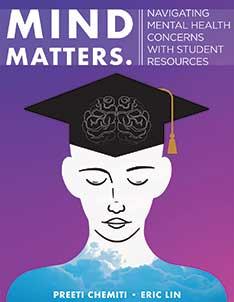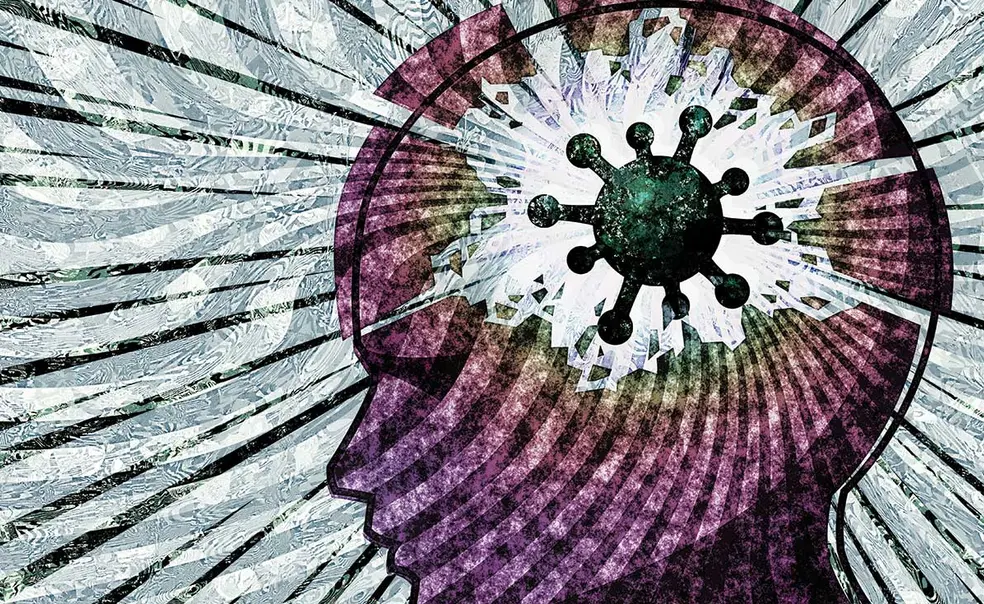COVID Uncertainty Prompts Mental Health Focus Among Students
Loneliness, anxiety, and depression are among the conditions students report
For most of the fall semester, Sidney Singer ’25 was pleased that her first few months at Princeton seemed mostly normal. Mask and testing requirements were welcome routines in exchange for a typical college experience. That was until December, when the Nova Scotia, Canada, native tested positive for COVID-19 and her mental health took a hit.
“It’s really jarring to be put in isolation,” she said. Though the 10-day period was challenging, Singer appreciated the care package she received from the University, daily appointments with a nurse, and friends who checked on her. “I didn’t feel like I was forgotten about while I was there, which was nice,” she said. (Isolation is now five days, in accordance with new CDC guidelines.)
As Singer and the rest of the Princeton community prepared for the spring semester, fears of returning to restrictions on gatherings and interactions that may negatively affect student mental health loomed large as the omicron variant swiftly moved across the country. “I think the general sense is we’re happy to go back, but we’re also very nervous that it may be short-lived,” Singer said.
University officials confirmed in online meetings with students, faculty, and staff in January that the plan for the spring semester was to return to in-person learning with updated COVID protocols. In a Jan. 5 town hall hosted by the Undergraduate Student Government, Dean of the College Jill Dolan acknowledged the challenges this new period of uncertainty brings. “We know that your mental health has suffered. We know that you did not expect a college experience facing all these social and other restrictions,” she said. “We are really working hard to make it safe enough to lift these restrictions.”
As year three of the pandemic approaches, its impact on the mental health of college students remains concerning. Loneliness, anxiety, and depression are among the resulting conditions students report facing as fears of contracting COVID and keeping up with coursework continue, according to a global study published by the American Psychological Association. Similar trends ring true at Princeton, where, even before COVID, about 30 percent of students reported sometimes feeling hopeless, according to a 2020 survey by the National College Health Assessment.
“This fall we’ve seen a record number of students coming in needing services,” said Calvin Chin, director of Princeton’s Counseling and Psychological Services (CPS). Students have asked for support for a wide range of issues, from managing the grief of losing a loved one to navigating anxieties around socializing on campus again, Chin said.
“Everyone has lost a sense of normalcy,” he added. “Everyone has lost important experiences that they were looking forward to, and that has ramifications too, in terms of long-term mental health.”

In response, CPS has hired more staff, hosted listening groups where students can share their experiences, and partnered with outside services including ThrivingCampus as a resource to find off-campus therapists, among other initiatives. But some students feel these measures are not enough.
Hannah Reynolds ’22 described her experiences with CPS as a “mixed bag’’ that varied based on the counselors. She has been frustrated by inconsistencies between messages from University officials that encourage students to ask for help and professors who are unwilling to grant extensions or offer remote options to students. Reynolds is one of several students on campus who are advocating for more mental-health resources for students.
Others include Preeti Chemiti ’23 and Eric Lin ’23, who have worked together for the past year and a half to create Mind Matters, a mental-health guidebook that includes resources, statistics, and student perspectives. Through this project, funded by the Pace Center for Civic Engagement, they’ve created free Princeton-specific and general versions. More than 5,000 copies have been downloaded at mindmattersbook.org.
Their research has found similar alarming themes among Princeton students who report feelings of isolation, uncertainty, and anxiety. The duo is happy that students have found the guidebook helpful. “It was definitely really encouraging to see [and get] messages forwarded to us from students who were making use of the guidebook and finding some solace or help in what we put together,” Lin said. That said, mental health is still a problem and harder to manage when the future is uncertain, Chemiti added.
If there is a silver lining, at least past experiences have prepared students to think ahead, said Reynolds, who has already discussed alternate plans with friends to prepare for the possibility they might need to secure off-campus housing. “We’ve already learned to adapt,” she said. “It’s kind of expected that things won’t go to plan.”












No responses yet